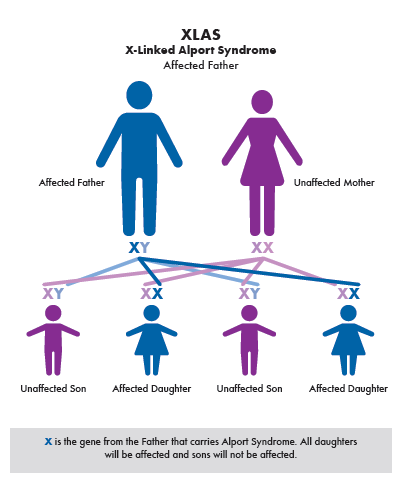This is the first of three articles this month that will provide an overview of what we know about the three most studied genetic types of Alport syndrome, advances in genetic testing and how these advances may affect the understanding of Alport syndrome.
Alport syndrome is caused by mutations in the type IV collagen genes. Type IV collagen is a family of six proteins, or chains, that are known as alpha-1 through alpha-6. Mutations that affect the alpha-3, alpha-4, and alpha-5 chains cause Alport syndrome. The alpha-3, 4, 5 chain is a major component of basement membranes in the kidney, ears, and eyes.
The most common form of Alport syndrome accounts for 80% to 85% of the cases and results from mutations of the alpha-5 chain (gene COL4A5) located on the X chromosome. This is called X-Linked Alport syndrome or XLAS.
This mutation is passed on to family members through the X chromosome. Since females have two X chromosomes and males only have one, males with XLAS are usually affected more severely than females. Often, females with XLAS do not develop kidney insufficiency until later in life (about 30% by age 60), leading to the inaccurate assumption that they are simply “carriers”. Both males and females who begin treatment early can see delayed disease progression.
Males will pass the gene to every daughter but to none of their sons, while females have a 50:50 chance with each pregnancy of passing on the gene to their child. This is illustrated in the diagram above.
Approximately 10 – 15% of XLAS mutations occur randomly (spontaneously), where neither parent carries a mutation. It is unknown what causes a spontaneous mutation.
Additional Resources:
Genetics on ASF website
Alport syndrome and Thin Basement Membrane Nephropathy by Dr. Clifford Kashtan
Other articles in our Alport syndrome Genetics series:
Part 2 of 3 – Alport syndrome Genetics 101: ARAS and ADAS
Part 3 of 3 – Alport syndrome Genetics 201: Understanding Specific Gene Mutations


